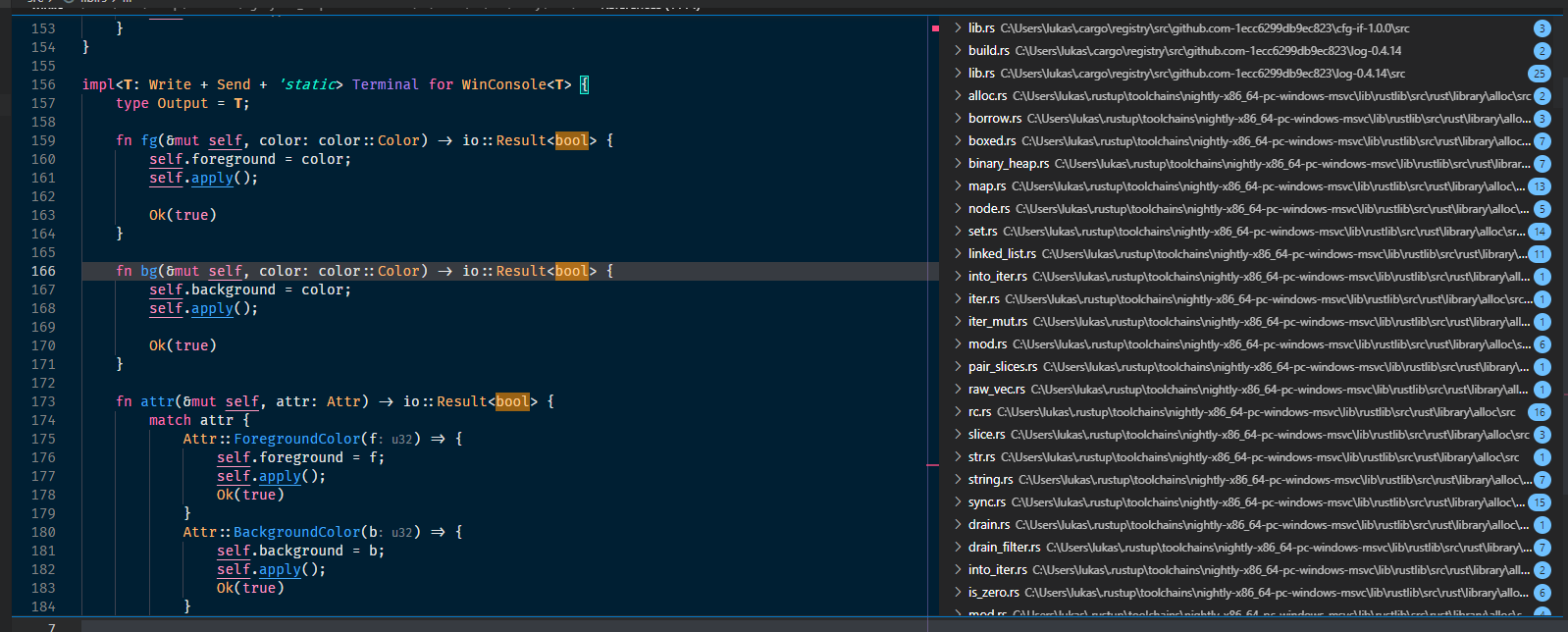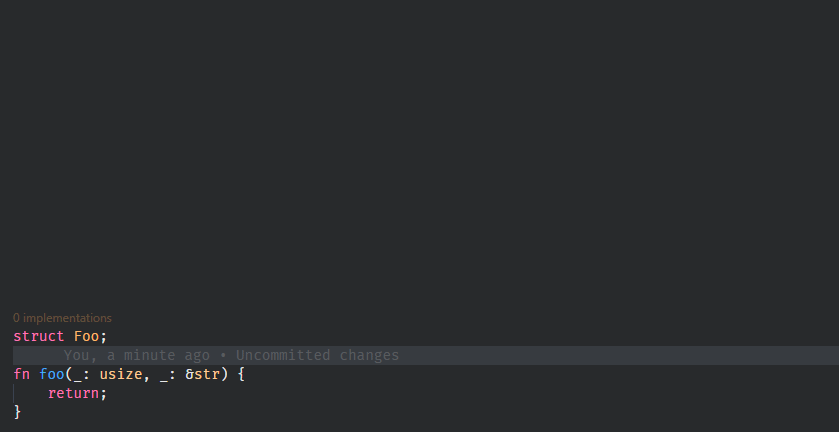8020: Power up goto_implementation r=matklad a=Veykril
by allowing it to be invoked on references of names, now showing all (trait)
implementations of the given type in all crates instead of just the defining
crate as well as including support for builtin types

Example screenshot of `impl`s of Box in `log`, `alloc`, `std` and the current crate. Before you had to invoke it on the definition where it would only show the `impls` in `alloc`.
Co-authored-by: Lukas Wirth <lukastw97@gmail.com>
What happens here is that we lower `: ` to a missing expression, and
then correctly record that the corresponding field expression resolves
to a specific field. Where we fail is in the mapping of syntax to this
missing expression. Doing it via `ast_field.expr()` fails, as that
expression is `None`. Instead, we go in the opposite direcition and ask
each lowered field about its source.
This works, but has wrong complexity `O(N)` and, really, the
implementation is just too complex. We need some better management of
data here.
8021: Enable searching for builtin types r=matklad a=Veykril
Not too sure how useful this is for reference search overall, but for completeness sake it should be there

Also enables document highlighting for them.
8022: some clippy::performance fixes r=matklad a=matthiaskrgr
use vec![] instead of Vec::new() + push()
avoid redundant clones
use chars instead of &str for single char patterns in ends_with() and starts_with()
allocate some Vecs with capacity to avoid unnecessary resizing
Co-authored-by: Lukas Wirth <lukastw97@gmail.com>
Co-authored-by: Matthias Krüger <matthias.krueger@famsik.de>
use vec![] instead of Vec::new() + push()
avoid redundant clones
use chars instead of &str for single char patterns in ends_with() and starts_with()
allocate some Vecs with capacity to avoid unneccessary resizing
7966: Diagnose files that aren't in the module tree r=jonas-schievink a=jonas-schievink
Fixes https://github.com/rust-analyzer/rust-analyzer/issues/6377
I'm not sure if this is the best way to do this. It will cause false positives for all `include!`d files (though I'm not sure how much IDE functionality we have for these).
Co-authored-by: Jonas Schievink <jonasschievink@gmail.com>
7795: Show docs on hover for keywords and primitives r=matklad a=Veykril

It's a bit annoying that this requires the `SyntaxNode` and `Semantics` to be pulled through `hover_for_definition` just so we can get the `std` crate but I couldn't think of a better way.
Co-authored-by: Lukas Wirth <lukastw97@gmail.com>
7335: added region folding r=matklad a=LucianoBestia
Regions of code that you'd like to be folded can be wrapped with `// #region` and `// #endregion` line comments.
This is called "Region Folding". It is originally available for many languages in VSCode. But Rust-analyzer has its own folding function and this is missing.
With this Pull Request I am suggesting a simple solution.
The regions are a special kind of comments, so I added a bit of code in the comment folding function.
The regex to match are: `^\s*//\s*#?region\b` and `^\s*//\s*#?endregion\b`.
The number of space characters is not important. There is an optional # character. The line can end with a name of the region.
Example:
```rust
// 1. some normal comment
// region: test
// 2. some normal comment
calling_function(x,y);
// endregion: test
```
I added a test for this new functionality in `folding_ranges.rs`.
Please, take a look and comment.
I found that these exact regexes are already present in the file `language-configuration.json`, but I don't find a way to read this configuration. So my regex is hardcoded in the code.
7691: Suggest name in extract variable r=matklad a=cpud36
Generate better default name in extract variable assist as was mentioned in issue #1587
# Currently supported
(in order of declining precedence)
1. Expr is argument to a function; use corresponding parameter name
2. Expr is result of a function or method call; use this function/method's name
3. Use expr type name (if possible)
4. Fallback to `var_name` otherwise
# Showcase


# Questions
* Should we more aggressively strip known types? E.g. we already strip `&T -> T`; should we strip `Option<T> -> T`, `Result<T, E> -> T`, and others?
* Integers and floats use `var_name` by default. Should we introduce a name, like `i`, `f` etc?
* Can we return a list and suggest a name when renaming(like IntelliJ does)?
* Should we add counters to remove duplicate variables? E.g. `type`, `type1`, type2`, etc.
Co-authored-by: Luciano Bestia <LucianoBestia@gmail.com>
Co-authored-by: Luciano <31509965+LucianoBestia@users.noreply.github.com>
Co-authored-by: Vladyslav Katasonov <cpud47@gmail.com>
7778: Fix lowering trailing self paths in UseTrees r=Veykril a=Veykril
Noticed that hovering over `self` in a use tree like `use foo::bar::{self}` showing documentation and such for the current module instead of `bar`.
Co-authored-by: Lukas Wirth <lukastw97@gmail.com>